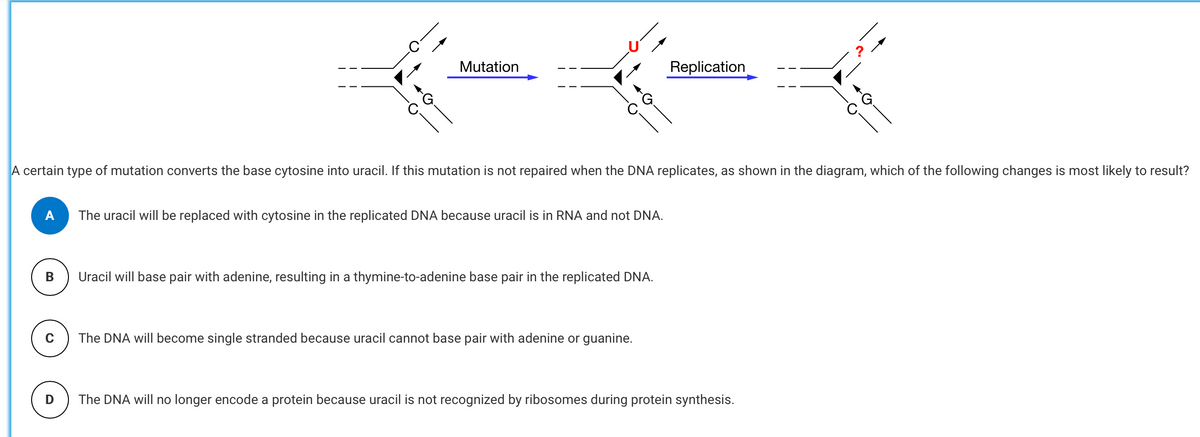A certain type of mutation converts the base cytosine into uracil. If this mutation is not repaired when the DNA replicates, as shown in the diagram, which of the following changes is most likely to result? A B с D The uracil will be replaced with cytosine in the replicated DNA because uracil is in RNA and not DNA. Uracil will base pair with adenine, resulting in a thymine-to-adenine base pair in the replicated DNA. The DNA will become single stranded because uracil cannot base pair with adenine or guanine. The DNA will no longer encode a protein because uracil is not recognized by ribosomes during protein synthesis.
A certain type of mutation converts the base cytosine into uracil. If this mutation is not repaired when the DNA replicates, as shown in the diagram, which of the following changes is most likely to result? A B с D The uracil will be replaced with cytosine in the replicated DNA because uracil is in RNA and not DNA. Uracil will base pair with adenine, resulting in a thymine-to-adenine base pair in the replicated DNA. The DNA will become single stranded because uracil cannot base pair with adenine or guanine. The DNA will no longer encode a protein because uracil is not recognized by ribosomes during protein synthesis.
Biology 2e
2nd Edition
ISBN:9781947172517
Author:Matthew Douglas, Jung Choi, Mary Ann Clark
Publisher:Matthew Douglas, Jung Choi, Mary Ann Clark
Chapter3: Biological Macromolecules
Section: Chapter Questions
Problem 20RQ: How does the double helix structure of DNA support its role in encoding the genome? The...
Related questions
Question
I need an answer

Transcribed Image Text:B
Mutation
A certain type of mutation converts the base cytosine into uracil. If this mutation is not repaired when the DNA replicates, as shown in the diagram, which of the following changes is most likely to result?
C
The uracil will be replaced with cytosine in the replicated DNA because uracil is in RNA and not DNA.
Uracil will base pair with adenine, resulting in a thymine-to-adenine base pair in the replicated DNA.
Replication
The DNA will become single stranded because uracil cannot base pair with adenine or guanine.
The DNA will no longer encode a protein because uracil is not recognized by ribosomes during protein synthesis.
Expert Solution
Introduction:
- Mutation is defined as a change in an organism's genetic material.
- Nucleotide bases are the fundamental components of DNA and RNA.
- Base mutations can occur as a result of errors during DNA replication or from external factors such as radiation or chemicals.
- These mutations can change the DNA's sequence, which can have a variety of effects on the characteristics and behaviour of an organism.
Trending now
This is a popular solution!
Step by step
Solved in 2 steps

Knowledge Booster
Learn more about
Need a deep-dive on the concept behind this application? Look no further. Learn more about this topic, biology and related others by exploring similar questions and additional content below.Recommended textbooks for you

Biology 2e
Biology
ISBN:
9781947172517
Author:
Matthew Douglas, Jung Choi, Mary Ann Clark
Publisher:
OpenStax

Biology: The Dynamic Science (MindTap Course List)
Biology
ISBN:
9781305389892
Author:
Peter J. Russell, Paul E. Hertz, Beverly McMillan
Publisher:
Cengage Learning

Biochemistry
Biochemistry
ISBN:
9781305577206
Author:
Reginald H. Garrett, Charles M. Grisham
Publisher:
Cengage Learning

Biology 2e
Biology
ISBN:
9781947172517
Author:
Matthew Douglas, Jung Choi, Mary Ann Clark
Publisher:
OpenStax

Biology: The Dynamic Science (MindTap Course List)
Biology
ISBN:
9781305389892
Author:
Peter J. Russell, Paul E. Hertz, Beverly McMillan
Publisher:
Cengage Learning

Biochemistry
Biochemistry
ISBN:
9781305577206
Author:
Reginald H. Garrett, Charles M. Grisham
Publisher:
Cengage Learning

Concepts of Biology
Biology
ISBN:
9781938168116
Author:
Samantha Fowler, Rebecca Roush, James Wise
Publisher:
OpenStax College

Anatomy & Physiology
Biology
ISBN:
9781938168130
Author:
Kelly A. Young, James A. Wise, Peter DeSaix, Dean H. Kruse, Brandon Poe, Eddie Johnson, Jody E. Johnson, Oksana Korol, J. Gordon Betts, Mark Womble
Publisher:
OpenStax College

Biology Today and Tomorrow without Physiology (Mi…
Biology
ISBN:
9781305117396
Author:
Cecie Starr, Christine Evers, Lisa Starr
Publisher:
Cengage Learning